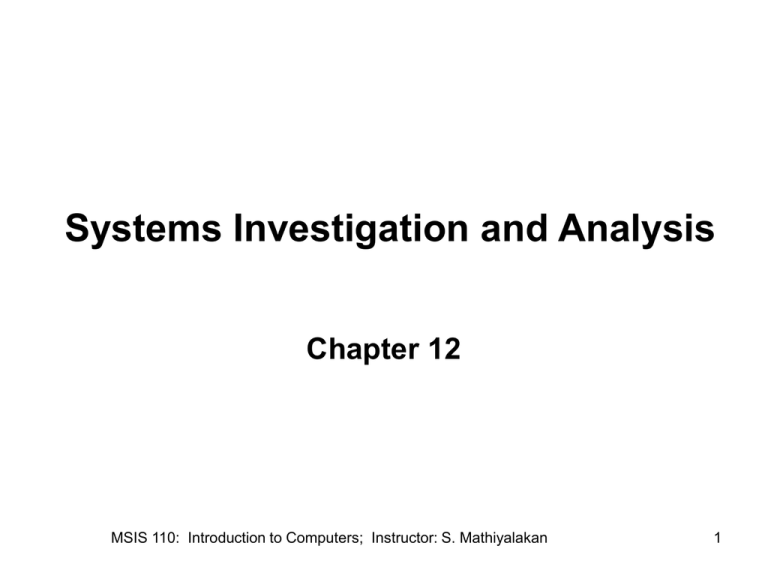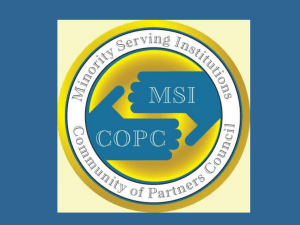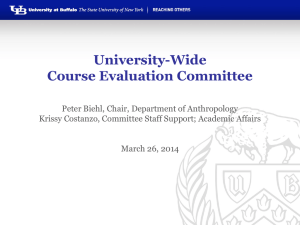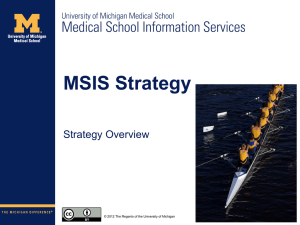Chapter12
advertisement

Systems Investigation and Analysis Chapter 12 MSIS 110: Introduction to Computers; Instructor: S. Mathiyalakan 1 Principles and Learning Objectives • Effective systems development requires a team effort of stakeholders, users, managers, systems development specialists, and various support personnel, and it starts with careful planning. – Identify the key participants in the systems development process and discuss their roles. – Define the term information systems planning and list several reasons for initiating a systems project. – Identify important system performance requirements for applications that run on the Internet or a corporate intranet or extranet. – Discuss three trends that illustrate the impact of enterprise resource planning software packages on systems development. MSIS 110: Introduction to Computers; Instructor: S. Mathiyalakan 2 Principles and Learning Objectives • Systems development often uses tools to select, implement, and monitor projects, including net present value (NPV), prototyping, rapid application development, CASE tools, and object-oriented development. – Discuss the key features, advantages, and disadvantages of the traditional, prototyping, rapid application development, and enduser systems development life cycles. – Identify several factors that influence the success or failure of a systems development project. – Discuss the use of CASE tools and the object-oriented approach to systems development. MSIS 110: Introduction to Computers; Instructor: S. Mathiyalakan 3 Principles and Learning Objectives • Systems development starts with investigation and analysis of existing systems. – State the purpose of systems investigation. – Discuss the importance of performance and cost objectives. – State the purpose of systems analysis and discuss some of the tools and techniques used in this phase of systems development. MSIS 110: Introduction to Computers; Instructor: S. Mathiyalakan 4 An Overview of Systems Development MSIS 110: Introduction to Computers; Instructor: S. Mathiyalakan 5 Participants in Systems Development MSIS 110: Introduction to Computers; Instructor: S. Mathiyalakan 6 Initiating Systems Development MSIS 110: Introduction to Computers; Instructor: S. Mathiyalakan 7 Information Systems Planning MSIS 110: Introduction to Computers; Instructor: S. Mathiyalakan 8 Aligning Corporate and IS Goals MSIS 110: Introduction to Computers; Instructor: S. Mathiyalakan 9 Developing a Competitive Advantage • Creative analysis • Critical analysis – Going beyond automating manual systems – Question assumptions – Identify and resolve conflicting objectives MSIS 110: Introduction to Computers; Instructor: S. Mathiyalakan 10 Establishing Objectives for Systems Development • Performance objectives – Output quality or usefulness – Output format quality or usefulness – Speed at which output is produced • Cost objectives – Development costs – Fixed investments – Ongoing operating costs – Uniqueness costs MSIS 110: Introduction to Computers; Instructor: S. Mathiyalakan 11 Systems Development and ECommerce • Internet technology - enables companies to extend their information systems beyond their boundaries to reach their customers, suppliers, and partners. • Dynamic Core Business Application that runs over the Web - must be reliable and fault tolerant, providing continuous availability while processing all transactions accurately. MSIS 110: Introduction to Computers; Instructor: S. Mathiyalakan 12 Trends in Systems Development and ERP • ERP vendor as one-stop provider • Applications to integrate with ERP systems • External consulting MSIS 110: Introduction to Computers; Instructor: S. Mathiyalakan 13 Systems Development Life Cycles MSIS 110: Introduction to Computers; Instructor: S. Mathiyalakan 14 Systems Development Life Cycles MSIS 110: Introduction to Computers; Instructor: S. Mathiyalakan 15 The Traditional Systems Development Life Cycle MSIS 110: Introduction to Computers; Instructor: S. Mathiyalakan 16 Advantages and Disadvantages of Traditional SDLC MSIS 110: Introduction to Computers; Instructor: S. Mathiyalakan 17 Prototyping MSIS 110: Introduction to Computers; Instructor: S. Mathiyalakan 18 Prototyping MSIS 110: Introduction to Computers; Instructor: S. Mathiyalakan 19 Advantages and Disadvantages of Prototyping MSIS 110: Introduction to Computers; Instructor: S. Mathiyalakan 20 Rapid Application Development (RAD) MSIS 110: Introduction to Computers; Instructor: S. Mathiyalakan 21 Reasons for Outsourcing MSIS 110: Introduction to Computers; Instructor: S. Mathiyalakan 22 Factors Affecting Systems Development Success • Degree of Change – Continuous Improvement versus Reengineering – Managing change MSIS 110: Introduction to Computers; Instructor: S. Mathiyalakan 23 Factors Affecting Systems Development Success MSIS 110: Introduction to Computers; Instructor: S. Mathiyalakan 24 Quality and Standards MSIS 110: Introduction to Computers; Instructor: S. Mathiyalakan 25 The Capability Maturity Model (CMM) MSIS 110: Introduction to Computers; Instructor: S. Mathiyalakan 26 Project Management • • • • Project schedule Project milestone Project deadline Critical path MSIS 110: Introduction to Computers; Instructor: S. Mathiyalakan 27 Use of Project Management Tools MSIS 110: Introduction to Computers; Instructor: S. Mathiyalakan 28 Use of Project Management Tools MSIS 110: Introduction to Computers; Instructor: S. Mathiyalakan 29 Computer-Aided Software Engineering (CASE) Tools Automate many of the tasks required in a systems development effort and enforce adherence to the SDLC, thus instilling a high degree of rigor and standardization to the entire systems development process • Upper-CASE tools - CASE packages that focus on activities associated with the early stages of systems development. • Lower-CASE tools - focus on the later stages of systems development and are capable of automatically generating structured program code. • Integrated-CASE tools - provide links between upperand lower-CASE packages. MSIS 110: Introduction to Computers; Instructor: S. Mathiyalakan 30 CASE Tools MSIS 110: Introduction to Computers; Instructor: S. Mathiyalakan 31 Object-Oriented Systems Development Object-oriented systems development typically involves: • Identifying potential problems and opportunities within the organization that would be appropriate for the OO approach • Defining the kind of system users require • Designing the system • Programming or modifying modules • Evaluation by users • Periodic review and modification MSIS 110: Introduction to Computers; Instructor: S. Mathiyalakan 32 Systems Investigation In general, systems investigation attempts to uncover answers to the following questions: – What primary problems might a new or enhanced system solve? – What opportunities might a new or enhanced system provide? – What new hardware, software, databases, telecommunications, personnel, or procedures will improve an existing system or are required in a new system? – What are the potential costs (variable and fixed)? – What are the associated risks? MSIS 110: Introduction to Computers; Instructor: S. Mathiyalakan 33 Participants in Systems Investigation MSIS 110: Introduction to Computers; Instructor: S. Mathiyalakan 34 Feasibility Analysis MSIS 110: Introduction to Computers; Instructor: S. Mathiyalakan 35 Sample Net Present Value Calculation MSIS 110: Introduction to Computers; Instructor: S. Mathiyalakan 36 Object-Oriented Systems Investigation MSIS 110: Introduction to Computers; Instructor: S. Mathiyalakan 37 The Systems Investigation Report MSIS 110: Introduction to Computers; Instructor: S. Mathiyalakan 38 Systems Analysis MSIS 110: Introduction to Computers; Instructor: S. Mathiyalakan 39 Identifying Sources of Data MSIS 110: Introduction to Computers; Instructor: S. Mathiyalakan 40 Collecting Data MSIS 110: Introduction to Computers; Instructor: S. Mathiyalakan 41 Data Analysis • • • • • Data modeling Activity modeling Application flowcharts Grid charts CASE tools MSIS 110: Introduction to Computers; Instructor: S. Mathiyalakan 42 Data and Activity Modeling MSIS 110: Introduction to Computers; Instructor: S. Mathiyalakan 43 Application Flowcharts MSIS 110: Introduction to Computers; Instructor: S. Mathiyalakan 44 Grid Charts MSIS 110: Introduction to Computers; Instructor: S. Mathiyalakan 45 Requirements Analysis • • • • Asking directly Critical success factors (CSFs) The IS plan Screen and report layout MSIS 110: Introduction to Computers; Instructor: S. Mathiyalakan 46 The IS Plan MSIS 110: Introduction to Computers; Instructor: S. Mathiyalakan 47 Screen and Report Layout MSIS 110: Introduction to Computers; Instructor: S. Mathiyalakan 48 Object-Oriented Systems Analysis MSIS 110: Introduction to Computers; Instructor: S. Mathiyalakan 49 The Systems Analysis Report MSIS 110: Introduction to Computers; Instructor: S. Mathiyalakan 50 Summary • Systems development team - of stakeholders, users, managers, systems development specialists, and various support personnel • Five phases of the traditional SDLC - investigation, analysis, design, implementation, and maintenance and review • Systems investigation participants - stakeholders, users, managers, employees, analysts, and programmers MSIS 110: Introduction to Computers; Instructor: S. Mathiyalakan 51






